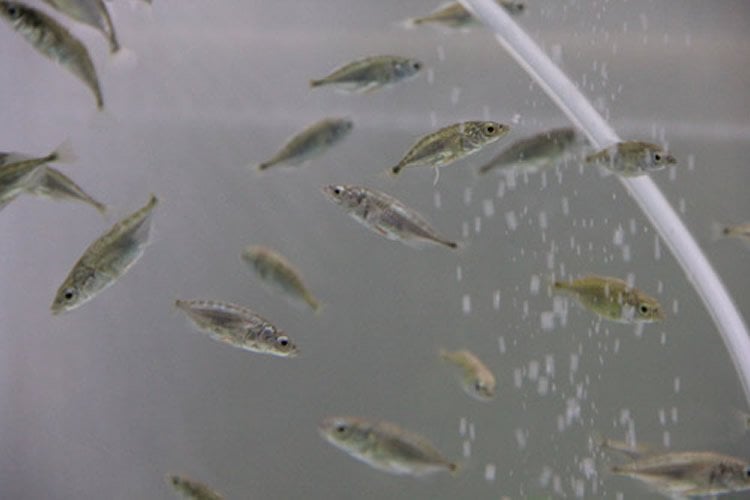Summary: Despite having individual personalities, researchers report that differences get suppressed when fish are in a group.
Source: University of Bristol.
New research carried out by scientists at the University of Bristol has shown that despite individual animals having their own personality, this gets suppressed when they make decisions together in a group.
Dr Christos Ioannou and his colleagues from the School of Biological Sciences tested three-spined sticklebacks (the UK’s smallest freshwater fish) alone and in groups of ten.
They found that just like in humans, braver individuals led the groups, and that the fish stuck together when making a risky decision.
But they concluded that the conformity needed to make a group decision is stronger than braver fish leading, meaning overall, that the individual personalities of fish were lost when in a group.
Dr Ioannou said: “This is the first time that the suppression of personality in groups has been linked to its underlying cause, which is conformity in group decision making.”
The researchers also found that testing in a group did not have a lasting effect when individuals were retested alone; it was as if the group tests never happened.

Dr Ioannou added: “The behaviour of the fish seems to be ‘plastic’ to the social situation – they show consistent individual differences in behaviour when tested alone – reflecting personality, but they are also happy to suppress this to be able to stick together with their shoal mates if there are others around.”
The research, published today in Science Advances, suggests that in social animals, when things get dangerous and animals form cohesive groups, risk-taking tendency when alone may not be a good indicator of the risk an individual actually faces.
Funding: Funding for the research came from the Leverhulme Trust and the Natural Environment Research Council.
Source: University of Bristol
Image Source: This NeuroscienceNews.com image is adapted from the University of Bristol press release.
Original Research: Full open access research for “Consensus and experience trump leadership, suppressing individual personality during social foraging” by Nicholas D. McDonald, Sean A. Rands, Francesca Hill, Charlotte Elder and Christos C. Ioannou in Science Advances. Published online September 14 2017 doi:10.1126/sciadv.1600892
[cbtabs][cbtab title=”MLA”]University of Bristol. “Fish Lose Their Unique Personalities When They Go To ‘School’.” NeuroscienceNews. NeuroscienceNews, 17 September 2017.
<https://neurosciencenews.com/group-individuality-fish-5066/>.[/cbtab][cbtab title=”APA”]University of Bristol. (2017, September 17). Fish Lose Their Unique Personalities When They Go To ‘School’. NeuroscienceNews. Retrieved September 17, 2017 from https://neurosciencenews.com/group-individuality-fish-5066/[/cbtab][cbtab title=”Chicago”]University of Bristol. “Fish Lose Their Unique Personalities When They Go To ‘School’.” https://neurosciencenews.com/group-individuality-fish-5066/ (accessed September 17, 2017).[/cbtab][/cbtabs]
Abstract
Consensus and experience trump leadership, suppressing individual personality during social foraging
Whether individual behavior in social settings correlates with behavior when individuals are alone is a fundamental question in collective behavior. However, evidence for whether behavior correlates across asocial and social settings is mixed, and no study has linked observed trends with underlying mechanisms. Consistent differences between individuals in boldness, which describes willingness to accept reward over risk, are likely to be under strong selection pressure. By testing three-spined sticklebacks (Gasterosteus aculeatus) in a risky foraging task alone and repeatedly in shoals, we demonstrate that the expression of boldness in groups is context-specific. Whereas personality is repeatable in a low-risk behavior (leaving a refuge), the collectively made consensus decision to then cross the arena outweighs leadership by bolder individuals, explaining the suppression of personality in this context. However, despite this social coordination, bolder individuals were still more likely to feed. Habituation and satiation over repeated trials degrade the effect of personality on leaving the refuge and also whether crossing the arena is a collective decision. The suppression of personality in groups suggests that individual risk-taking tendency may rarely represent actual risk in social settings, with implications for the evolution and ecology of personality variation.
“Consensus and experience trump leadership, suppressing individual personality during social foraging” by Nicholas D. McDonald, Sean A. Rands, Francesca Hill, Charlotte Elder and Christos C. Ioannou in Science Advances. Published online September 14 2017 doi:10.1126/sciadv.1600892






